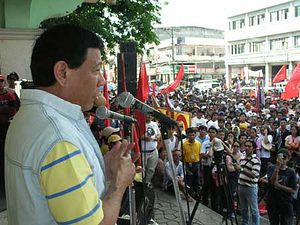This week, Philippine President Rodrigo Duterte signed a proclamation terminating the peace process with the communist-led National Democratic Front (NDF). Though it is still too early to determine exactly what this means for one of Asia’s longest insurgencies, the development bears careful watching in the context of the Duterte administration’s evolving governance of the Philippines.
Though there have been previous pronouncements which have simply suspended peace talks, Duterte’s proclamation signed on November 23 is different because it formally closes the door for now to the resumption of negotiations. In that sense, it represents an end to the peace process for the first time since 1999, when former President Joseph Estrada issued a similar directive and launched an all-out war campaign against communist rebels belonging to the New People’s Army (NPA).
The Maoist NPA has been waging one of Asia’s longest-running insurgencies. It first gained nationwide presence during the anti-dictatorship struggle in the 1970s after former Philippine President Ferdinand Marcos declared martial law.
Peace talks between the Reds and the government started in 1986 after the ouster of Marcos, but successive governments have failed to convince the rebels to sign a final peace agreement. There were high expectations that a Duterte presidency could end the NPA rebellion since he had close ties with the Left when he was mayor of Davao City in the southern Philippines for more than two decades.
Those hopes have quickly been dashed. Four rounds of talks that were briskly held between the government and the NDF in 2016 had further raised hopes about the prospect of finally achieving peace. But Duterte suspended the peace talks in February 2017 after the NPA ended its unilateral ceasefire.
Peace advocates, for their part, had nonetheless continued to ask both sides to find a common ground in moving forward the negotiations, encouraged by the incremental progress made in some areas. For instance, prior to the suspension of the talks, the government and the NDF had agreed in principle to support the free distribution of land to small farmers, a significant move because majority of NPA members are farmers and indigenous peoples in remote villages.
Apart from his occasional rants against the NPA, Duterte had never expressed interest in formally terminating the peace process altogether. But last week, he was outraged to learn that an infant was killed during an NPA ambush. That was apparently the last straw and led him to formally end the peace talks with his erstwhile allies which he now branded as terrorists.
Before the announcement of the proclamation, the government’s chief negotiator had already indicated that all planned meetings with the NDF have been suspended already. This suggested that there were informal talks between the two parties on how to resume the peace process. Later, the NDF confirmed that the fifth round of talks was indeed already scheduled this month and that agreements on general amnesty for political prisoners, coordinated ceasefire, and substantive aspects of the social and economic agenda were ready for signing.
The NDF, for its part, unsurprisingly accused Duterte of sabotaging the peace process with its move. It asserted that the group never threatened to terminate the peace process despite Duterte’s atrocious human rights record and his failure to uphold his campaign promise of fighting oligarchs. It vowed to resist Duterte’s order to launch a crackdown against suspected communist sympathizers.
Beyond just the peace process itself, it remains to be seen whether Duterte’s proclamation could have broader implications. Could this, for instance, indicate his severance of ties with the Left? Will he expel the remaining Left-nominated members of his Cabinet?
The termination of peace talks will also probably be used as a justification for the extension of martial law in Mindanao which is set to expire next month. Earlier, Duterte’s defense secretary, Delfin Lorenzana, said martial law was needed to defeat not just ISIS-backed terrorists in Marawi but also NPA rebels in the whole of Mindanao.
Will the end of the peace talks lead to the expansion of the all-out war policy of the government beyond Mindanao?
After hosting the East Asia Summit, the Duterte government seemed to have clinched the support of several governments, notably China, Russia, and the United States, in strengthening the country’s military capabilities. Will this involve support for his counterinsurgency operations against the NPA?
Beyond all this, what really worries many people in the Philippines is the repeated pronouncements of Duterte and his rabid supporters about the establishment of a so-called revolutionary government to solve the country’s problems. Some believe it is being peddled to implement Duterte’s vision of turning the Philippines into a federal state. But there is also the highly probable scenario of Duterte establishing a dictatorship similar to what Marcos did in the past. Seen from this perspective, the conflict with the NPA is something that any authoritarian leader would want to escalate to push the country nearer to a total war scenario and compel the use of extralegal powers of the state.
































